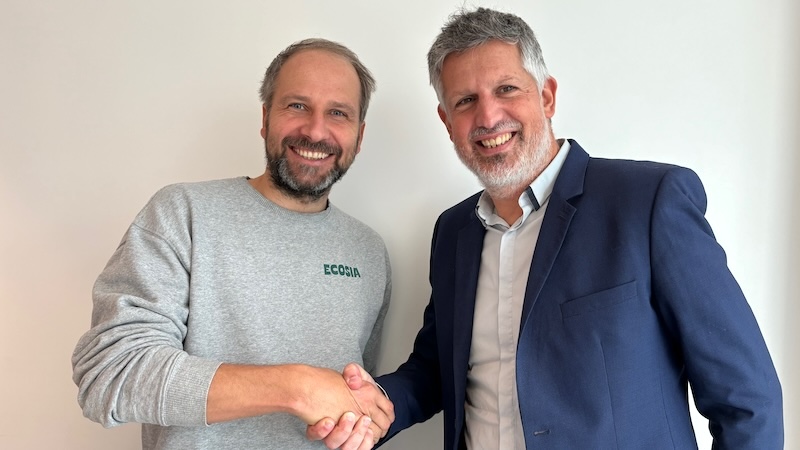
Ecosia and Qwant want to jointly develop a European search index. The goal of the two search engine providers: More independence from Google and Bing – also for Europe. In an interview: Ecosia founder and managing director Christian Kroll.
BASIC thinking: Hello Christian, together with Qwant you want to develop a European search engine index. Why?
Christian Kroll: We've been thinking about this for many years, because as a search engine it would be nice if you weren't dependent on others. All other search engines like Startpage, DuckDuckGo or we depend on either Google or Bing. On the one hand, these are our partners, but at the same time they are also our competitors.
Several things are currently coming together that make us believe in having our own search index – even if that is a huge task. On the one hand, the Digital Markets Act (DMA) has been in place since March 2024, which allows for new legal framework conditions. Among other things, the large platform monopolies are obliged to share data to a certain extent or to grant us access.
For example, there are search queries that we have never seen before. But Google may have already seen it a few times and can therefore answer better. We will also be able to access such things in the future. Another example: A restaurant only enters its opening hours on Google Maps. How are we supposed to know when the opening times have changed, for example?
In principle, the DMA assures us that we can get to such things better – and that has already happened in some cases. Additionally, there are now innovations like LMMs (Large Language Models) that make it easier to build a search index than it was even five years ago. Computing capacities have also become significantly cheaper.
The Generative Future of Internet Search
How does this change internet searches?
Search engines are increasingly moving from a page with blue links to a page that already shows perfect answers – perhaps with a few sources and a few links. This generative search is trending.
Neither we nor Google know exactly what this will look like in the future. But it is quite clear that something will happen in this direction. Since Google and Bing are our competitors, we have no guarantee that we will continue to get the traffic we do now. That's why we want to have our own search index.
Microsoft has also raised prices because it's sitting on a goldmine. Microsoft realized: We have something that not only we need, but all AI applications such as ChatGPT also need.
Such language models require current data to work. But you can only get this via a web index. We want to prepare for this generative future – especially since more and more companies like Meta or OpenAI will need a good index for their products.
How do you develop a search index?
How can one imagine the development and function of such an index?
First of all, you have to crawl, i.e. use a program to read as many websites as possible and see how they are linked to each other. Then you already know roughly what the content is. You can then tag these. For example, if I type “Donald Trump,” there are probably millions of results.
But that doesn't help at first, because you want to get specific or good information on a topic. That's why a certain ranking is needed, based on certain terms that match each other in terms of content.
This ranking needs to be trained with user data to remember which content and articles are more relevant. Constant training is an extremely important component – and you need users for that. We and Qwant can build such a search index because we are the two largest European search engines that have users – i.e. real search traffic.
This is the only way to gradually improve your index. Crawling the web is a prerequisite for this. But the relevance and the ranking have to work.
There are a few things you have to build around all of this. For example, if you want to know what the weather will be like, you don't want to see ten blue links, but rather a small box that shows the weather. It's not just about the index itself, but a well-ranked index. Added to this is the generative aspect.
For example, if someone asks: “What does Donald Trump like to eat?” Then an LLM is used that reads through websites and then says, for example: “Steak and potatoes”.
A European search index against dependence on US technologies
Does that mean you also want to integrate AI functions like Google’s AI Overview into your search?
Google has thousands of times more resources than us. That means: We first have to wait and see what the others do. In addition to relevance, there are also other issues. For example, the question arises as to what happens to the actors who provide content.
One consequence of generative search is that people no longer click out of the search results page. This means: For example, you get an answer directly on Google and don't click any further. Such questions need to be answered.
What we do first is ensure that we have the technology to be able to participate in principle in this transformation. I can't say exactly what that will look like at the moment. But I am sure that we will do something in this area. Because not only will we need this, but others will too.
A functioning web index is interesting for companies that do something with AI – but also for universities and governments. For me as a European citizen, it is important that we do not only depend on US technologies. If Trump says, “I’m going to turn off your search engines,” then we have to go back to phone books.
Is it conceivable that you make your index available to other search engine providers?
We talk to all the alternative search engines and want to say, “Hey, look what we have here. We would like to have you as a customer – if you want.”
But first we have to build the index so that we can use it ourselves to make sure that it is good. Then our doors are open.
Startpage or DuckDuckGo are in a similar situation. It’s called “European Search Perspective” (EUSP), but not everyone has to be European.
How will Ecosia change?
What changes your search index for Ecosia users?
We will gradually build in our search index. Our goal is to also display our own search results from the beginning of 2025. But we only do this if the result is at least as good as what we get from Google and Bing.
We can then see which is clicked better. Unfortunately, what we get from Google and Bing is not what Google and Bing themselves use. That's why I'm hoping for an improvement in the quality of the search results. We then have the freedom to rank things differently.
For example, when you search for news on Bing, the media that generates the best sales often appears at the top. Personally, I think you should point out the media that tells the truth. With our own index we have the opportunity to do things differently – even if it doesn't happen overnight.
Do you want to rely entirely on your own web index?
In the long term, yes. You can't do it from one day to the next because you have to learn. I hope that by the end of 2025 we will be able to handle a significant proportion of our search queries ourselves. Maybe 30 to 50 percent – I can't say exactly yet. After that it becomes gradually more difficult.
There may be deep search queries that we have never seen before. Then we first have to start our index to see what we output in response. This can take quite a while. It is also important that we continue to have access to the Google and Bing indices – including through the competition watchdogs.
Because there are things that we cannot depict because of our size. For one thing, we don't know when a restaurant changes its opening hours. That means: We have to get access to it. On the other hand: If someone is looking for something on a deeply scientific topic that hasn't come up with us yet, then we also have to get access.
If we continue to grow, hopefully after a few years we will be able to cover 80 to 90 percent of such things ourselves.
Google and Bing respond to European search index
How did Google and Bing react to your project?
We informed both of them beforehand and they said they thought it was great. I don't know if that's really the case. We are in a situation where extreme monopolies prevail. In Portugal, for example, Google has a 99 percent market share – on mobile devices. That's not healthy. Because no one should have that much market share in such an important area.
The European Commission has recognized this. Laws like the Digital Markets Act were written to make possible what we are doing now – creating opportunities for others. Of course, Google doesn't want to lose market share, but they don't want to put more pressure on themselves. Because with such a high market share, one cannot speak of competition on an equal footing.
That's why Google has a lot of regulations and rules that are probably annoying. You may sometimes wish you had a competitor. So I don't think it necessarily bothers Google. Overall, an alternative is good for the entire ecosystem. Many people see the fact that we make things possible as positive.
How do you want to finance these things?
We ourselves have a bit of money and Qwant has a bit of money. Qwant was acquired in mid-2023 by the founder of OVH, Europe's largest hosting company. This means that capital and server capacity are available. So we are two companies that not only have traffic, but also a bit of money.
All of this will cost several million, but we are ready to invest. We even save by using our own index. Because if we send traffic to Google or Microsoft, they want money from us. We would save ourselves this with our own index.
We also hope that we can gain customers ourselves. I wouldn't complain if someone from the German, European or French government said: “We think it's really great, we're supporting it with funding.” But we could do it on our own.
A joint search index from Ecosia and Qwant: why does it fit together?
It's difficult if we were to do this alone. Because for each of us it is a little bit too big. Pooling resources therefore makes sense. We are also both in a situation where we cannot get this technological innovation from our partners Google and Microsoft. In discussions we realized that we think in a similar way.
We see the challenge, but that it is also important to create an alternative that comes from Europe. Our goals were the same – including what we could both contribute. The shares in the joint company are therefore the same: fifty-fifty.
We are very lucky to have found a partner who is willing to say: “We’ll do this for a few years now”. For all of this to be successful, we not only need a good search engine, but also a good advertising network. Because a search engine without advertising is not a good business model.
It is also important that we have access to the platforms and that the competition authorities pay attention to this. The reason Google is so successful is not because everyone chooses Google as their search engine, but because Google is the default. These monopoly situations must be gradually dissolved. But that doesn't happen from one day to the next.
Christian, thank you very much for the interview.
Also interesting:
Source: https://www.basicthinking.de/blog/2024/11/14/wenn-trump-die-suchmaschinen-abstellt-muessen-wir-zurueck-zu-telefonbuechern/


